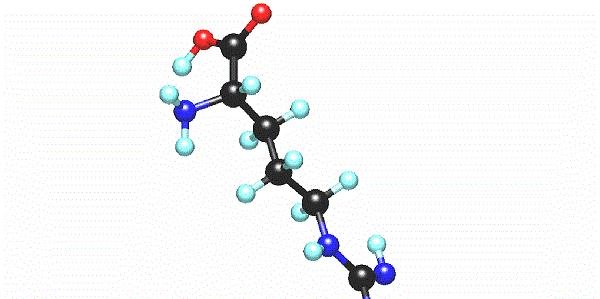Arginine

L-arginine /amino -5-guanidinopentanoic acid, C6H14N4O2/ was isolated for the first time in 1886, reportedly from an extract of lupine (Lupinus SPP) in the form of planting material, which belongs to the family legumes.
Arginine is called an amino acid normally produced by the body and is found in many foods that consist of proteins.
Amino-5-guanidinopentanoic acid is converted to nitric oxide, a blood vessel dilating agent called a vasodilator in the body.
Recent research suggests that arginine may help treat conditions that improve with increased vasodilation.
These clinical conditions are chest pain, atherosclerosis /partial or complete blockage of the artery/, cardiovascular disease, heart failure, erectile dysfunction, peripheral vascular disease and headaches from swelling of a blood vessel.
The amino acid also stimulates the production of proteins in the body and has been studied to heal wounds, build muscle mass, increase sperm production and prevent tissue loss in people with serious illnesses .
Nevertheless, its application should be done with caution.
Because Amino-5-guanidinopentanoic acid has been linked to deaths in some people with heart disease.
Caution is also needed when using it to treat preeclampsia /high blood pressure during pregnancy/.
Arginine hydrochloride is used to treat metabolic alkalosis but should be done under the supervision of a qualified healthcare professional.
The amino acid is sometimes injected intravenously to measure growth hormone levels in humans being tested for abnormal growth hormone levels such as panhypopituitarism, gigantism, acromegaly, or pituitary adenoma.
The US Food and Drug Administration has approved this application.
People with congenital defects in urea synthesis may have high blood ammonia levels and metabolic alkalosis. There is solid evidence supporting the use of the amino acid for this condition.
Amino-5-guanidinopentanoic acid should be avoided when its amount is elevated in the blood. A qualified medical professional after supervising the use.
There is scientific evidence that nutritional supplements containing L-arginine may be beneficial for people with ischemic heart disease, angina or blocked arteries, due to its dilating effect on blood vessels .
But longer-term and larger studies are needed to confirm these initial positive effects.
The effect of amino-5-guanidinopentanoic acid has been studied in people with heart failure. But longer studies are needed to confirm the clinical benefit of using L-arginine supplements in people with heart disease.
A small number of but authoritative studies report that arginine therapy has a positive effect on people who suffer from lameness or peripheral vascular disease.
Peripheral vascular disease, also known as intermittent claudication is a narrowing of the blood vessels in the legs and feet, which leads to painful sensations in these parts of the body and rapid fatigue.
Adrenoleukodystrophy /ALD/ is a rare hereditary disease which is characterized by damage to the brain and adrenal glands. It leads to dementia and adrenal insufficiency.
Arginine injections can help control the consequences of disease progression.
However, most of the research results are inconclusive. For this, further studies are needed to evaluate the use of the amino acid for the treatment of this disease.



